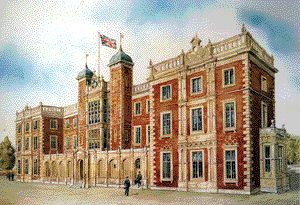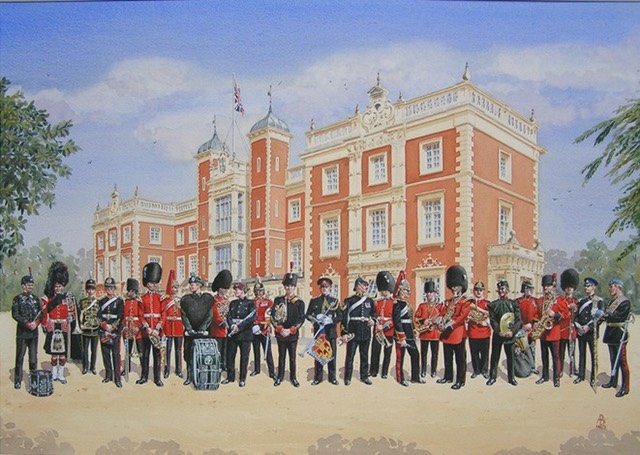The Royal Military School of Music Kneller Hall

In the eighteenth and early nineteenth centuries, the various regiments of the British Army, which-then as now- were fiercely individual in their ways, recruited and trained their own bands more or less as they pleased and each went its own sweet musical way. In the mid-1800s, the British army had occasion to mass a number of regiments together for a grand celebration. This was the first time the Army had ever used massed bands, and it was a signal for disaster, the various bands could not even play the National Anthem at the same tempo, in the same key or at the same pitch. The result was a cacophony of sound, it was deeply shaming to those concerned and, worse, carried the implication that regiments which could not even play together would be hard put to fight together, thus diminishing their important deterrent effect on many of our erstwhile enemies.
The Duke of Cambridge was the professional head of the Army at the time; he resolved that this sort of performance could not be tolerated and must never happen again. He pushed through a proposal that all Army musicians should in future be trained to uniform, high standards, and that they should be frequently inspected by one central musical organisation. The authorities bought Kneller Hall, the large country house and grounds of the distinguished court painter Sir Godfrey Kneller-sited in Twickenham, about fifteen miles south west of Central London- and founded the Royal Military School of Music there in 1857.
The School provides musical training for all Army musicians, from the basic recruit, all future Sergeants, all future Band Sergeant Majors, Student bandmasters and the Senior Bandmasters sitting the Advanced Certificate of Music.
The RMSM is also the home of the Corps of Army Music Headquarters, which is the focus for policy on Army Music. It is responsible for the professional efficiency of the musicians, the recruiting and manning and the career management of all the CA Mus personnel. Musicians are recruited into the Corps of Army Music by audition alone, (a good musician without qualifications is more use than a poor musician with a lot of paper qualifications) and since they will be soldiers they need to be of good character and must be able to pass an Army entrance and medical tests.
Musicians can join from seventeen years old, and start by completing their basic military training, or phase 1 as it is known by the Army, at the Army Training Regiment Winchester. Every entrant from whatever future employment, has to complete phase 1 before going onto continue with their individual skill to arms training. The musicians undergo musical training on the Foundation Course (phase 2 training) at the Royal Military School of Music Kneller Hall, for a minimum period of eight months, depending on ability.
On completion of the Trade Employment Qualification level 3 and the In Transit Medical Assistant training course, a Foundation course member will be posted to one of the twenty nine bands in the Army. Generally musicians will be sent to any band that has a requirement for their particular instrument, although some recruits will already be committed to a band of their choice by the audition stage. Providing a vacancy exists in that unit by the end of their training their preference is granted, but due to extenuating circumstances on occasions it will not always be possible.
On posting musicians can gain promotion, dependent on ability and vacancies, up to Warrant Officer Class 2, with a few opportunities to reach WO1. Outstanding musicians may be selected to undergo further training to qualify them to be a Bandmaster. The successful Student Bandmasters gain a BA (Hons) degree from Kingston University and a Bandmaster’s Certificate after three years.
After appointment as a WO1 Bandmaster with suitable recommendations, there is opportunity to earn promotion to the commissioned rank of Captain as a Director of Music. The career structure for officers in Army music peaks at Lieutenant Colonel. The Army is an equal opportunities employer and all of the career structures indicated are open to female musician. Every band has female members with a complete cross section of ranks from musician to WO2, although it has to be said that at this point there are no Bandmasters or Directors of Music that are female. There is nothing to stop anyone becoming a Student Bandmaster; we have had female Directors in the past but none at present.

Original painting by Alix Baker PCAFAS UA
Army Music - Training the professional musician as an Army musician you can be sure that your training will be comparable to any leading college of music in the world.
The Royal Military School of Music (RMSM), Kneller Hall is situated near Twickenham, about 9 miles from central London, and was formed in 1857 by Field Marshal HRH The Duke of Cambridge, then Commander in Chief of the British Army. Built in 1709, Kneller Hall was originally the country house of the celebrated court portrait painter Sir Godfrey Kneller.
Your instrumental training is undertaken on the Foundation Course; which lasts between 11 and 44 weeks (depending on your standard of musicianship on entry).
This is a rolling course, designed to allow musicians to fulfil their potential early, pass the mandatory tests, and be posted to a band as soon as possible.
We play and teach all the instruments of the orchestra including strings, with acoustic guitar, and vocal instruction. And we teach all these instruments in exactly the same way, to exactly the same standards, as any first-class music college in the world.
What we need are musicians who are keen to make a real musical contribution to the ensemble. We don't try to teach a standard 'Army' way of doing things: we expect students to think for themselves, be creative, and develop their own individual approach to music-making.
Tuition at Kneller Hall is delivered by some of the country's leading instrumental and academic professors, many of them the same people who play in the great London symphony orchestras and teach in the leading London music colleges, thus ensuring strong contemporary links with the world of civilian professional music.
Bit different today though…… sad days… crying shame!
